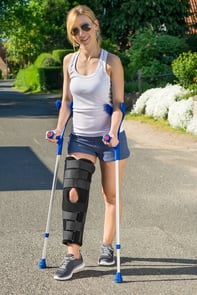 Returning to an active lifestyle after joint replacement surgery is an important benchmark of recovery, and the vast majority of patients for whom these procedures have become necessary are eager to reach that point. After all, many have seen slow joint deterioration and progressively worsening pain over several years that gradually limited activities, and these procedures hold the promise of restoring quality-of-life lost to that process.
Returning to an active lifestyle after joint replacement surgery is an important benchmark of recovery, and the vast majority of patients for whom these procedures have become necessary are eager to reach that point. After all, many have seen slow joint deterioration and progressively worsening pain over several years that gradually limited activities, and these procedures hold the promise of restoring quality-of-life lost to that process.
Of course, being active is also important for other reasons, including cardiovascular health, weight management, and overall health, and daily exercise helps improve the function and prolong the lifespan of prosthetic joints by strengthening surrounding muscles and bone. So how can you return to an active lifestyle after joint replacement surgery as quickly and safely as possible?
Taking good care of yourself and your new joint are key to a quick and successful recovery after joint replacement. Here are some important factors to keep in mind as you work to make the most of your recovery time:
-
Careful wound care: Proper wound care is essential to avoiding infection, one of the most common setbacks after any surgery. It is also key to promoting quick and complete healing and minimizing scarring. Be sure to ask for wound care instructions in writing when you are discharged from the hospital after surgery, and then follow those instructions to the letter.
-
Good nutrition: Eating well-balanced, nutrient-dense meals daily is an oft-overlooked but vital means of minimizing healing and recovery time. Healing and rehabilitation are hard work for your body, and it will need plenty of vitamins, minerals, and other essential nutrients to get the job done. Nutrients that are especially important during this time include proteins to help the body build and repair tissues and vitamin D and calcium for bone growth and repair.
-
Effective pain control and/or medication management: Keeping pain well under control via prescribed pain medications will help you stay motivated as you work to recover and rehabilitate after surgery. Taking other medications as prescribed – such as blood thinners and antibiotics, for example – will reduce your risk of complications that could impair your progress towards getting back to the active lifestyle you're looking forward to. Be sure to go over your medication schedule with staff carefully as you are being discharged from the hospital, and stick to it faithfully once you go home.
-
Intensive, comprehensive rehabilitation therapy: This is essential to making your quickest and best recovery after joint replacement, and going all-out by enrolling in an inpatient short-term rehab program is your best bet for making the fastest, most reliable progress towards your goal of getting back to an active lifestyle. A good inpatient program can offer a lot that the typical outpatient or home-based rehab therapy program cannot, including comprehensive treatment plans formulated by a team of rehabilitation specialists; a minimum of three hours of therapy daily; expert advice on nutrition; professional wound care and pain control; 24-hour access to staff, rehab equipment and facilities; comprehensive patient education; and much more. Not only do these programs offer more in terms of rehab progress, but they also relieve patients of the stress of managing their own recovery, placing the day-to-day details in the hands of an experienced team of rehabilitation professionals.
Getting back on your feet will take some time and a lot of effort, since joint replacement is serious surgery. However, by keeping the above points in mind and making recovery and rehabilitation your top priority, you can speed up the process, minimizing the time it takes for you to return to an active lifestyle.





